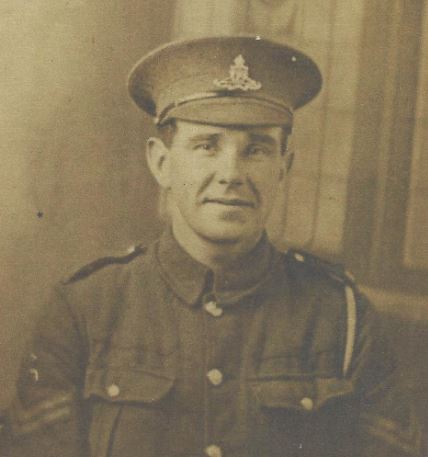Sjt
George Uren
Information about birth
|
Date of birth: 05/10/1887 |
|
Place of birth: Newcastle upon Tyne, Northumberland, England, United Kingdom |
General information
|
Profession: Coachman |
|
Religion: Church of England |
Army information
|
Country: England, United Kingdom |
|
Force: British Expeditionary Force |
|
Rank: Serjeant |
|
Service number: 27945 |
|
Enlistment place: Newcastle upon Tyne, Northumberland, England, United Kingdom |
|
Units: — Royal Field Artillery, "B" Bty. 315th Bde. (Last known unit) |
Information about death
|
Date of death: 13/09/1917 |
|
Place of death: Fosse Wood, Zillebeke, Belgium |
|
Cause of death: Killed in action (K.I.A.) |
|
Age: 29 |
Cemetery
|
The Huts Cemetery Plot: V Row: C Grave: 14 |
Distinctions and medals 3
|
1914-15 Star Medal — 12/03/1918 |
|
British War Medal Medal — 07/03/1920 |
|
Victory Medal Medal — 07/03/1920 |
Points of interest 3
| #1 | Place of birth | ||
| #2 | Enlistment place | ||
| #3 | Place of death (approximate) |
My story
Serjeant George Uren served in “B” Battery, of the Royal Field Artillery 315th Army Brigade, which participated in the Third Battle of Ypres.
At the start of the offensive the Batteries of the Brigade were stationed near Kemmel Hill, opposite the Messines Ridge. This was now a fairly quiet part of the front, as the offensive raged on further to the north. However on the 13th of August 1917 the Army Brigade moved towards the fighting. Its Batteries came under orders of the 242nd Artillery Brigade, of the 14th Divisional Artillery near Fosse Wood. On the next day all guns started targeting German Batteries, positions and supply lines. But the German artillery was equally on its toes and the Batteries and supply lines of the RFA 315th Army Brigade were shelled on a daily bases. Notwithstanding the persistent German counter shelling the Brigade remained active in the Fosse Wood area throughout August and September 1917.
On the 13th of September 1917 “B” Battery came under orders of the 39th Divisional Artillery and moved from Fosse Wood towards the hamlet of Verbrandenmolen.
Serjeant George Uren was mortally wounded, while organizing the relocation of “B” Battery. His remains were taken to the hinterland and buried on the nearby The Huts Cemetery. Named after a line of huts strung along the road from Dikkebus to Brandhoek, which were used by field ambulances during the offensive.
At the start of the offensive the Batteries of the Brigade were stationed near Kemmel Hill, opposite the Messines Ridge. This was now a fairly quiet part of the front, as the offensive raged on further to the north. However on the 13th of August 1917 the Army Brigade moved towards the fighting. Its Batteries came under orders of the 242nd Artillery Brigade, of the 14th Divisional Artillery near Fosse Wood. On the next day all guns started targeting German Batteries, positions and supply lines. But the German artillery was equally on its toes and the Batteries and supply lines of the RFA 315th Army Brigade were shelled on a daily bases. Notwithstanding the persistent German counter shelling the Brigade remained active in the Fosse Wood area throughout August and September 1917.
On the 13th of September 1917 “B” Battery came under orders of the 39th Divisional Artillery and moved from Fosse Wood towards the hamlet of Verbrandenmolen.
Serjeant George Uren was mortally wounded, while organizing the relocation of “B” Battery. His remains were taken to the hinterland and buried on the nearby The Huts Cemetery. Named after a line of huts strung along the road from Dikkebus to Brandhoek, which were used by field ambulances during the offensive.
Sources 3
|
Army Troops. 315 Army Field Artillery Brigade (The National Archives, KEW (TNA), WO 95/385/8). http://www.nationalarchives.gov.uk/ Further reference |
|
British Army World War I Medal Rolls Index Cards, 1914-1920 (The National Archives, KEW (TNA), WO 372). http://www.nationalarchives.gov.uk/ Sources used |
|
Census Returns of England and Wales, 1911 (The National Archives, KEW (TNA), RG14). http://www.nationalarchives.gov.uk/ Sources used |
More information 3
|
Commonwealth War Graves Commission Database https://www.cwgc.org/find-records/find-war-dead/casualty-details/156891 |
|
Namenlijst (In Flanders Fields Museum) https://namenlijst.org/publicsearch/#/person/_id=b873c8ad-bb4d-4ef7-a8d9-62fef8d382e8 |
|
Lives of the First World War (Imperial War Museum) https://livesofthefirstworldwar.iwm.org.uk/lifestory/4541389 |
